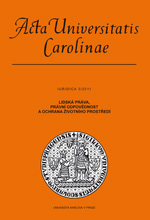Trestní odpovědnost jako nástroj prosazování ochrany životního prostředí v evropském kontextu
Criminal Liability as a Tool of Enforcement of the Environmental Protection in the EU Context
Author(s): Vojtěch StejskalSubject(s): Law, Constitution, Jurisprudence
Published by: Univerzita Karlova v Praze, Nakladatelství Karolinum
Keywords: enforcement of environmental protection; environmental protection; constitutional principles of environmental protection; criminal law; criminal principles; criminal lability; Criminal Code; Directive on criminal protection of the environment;
Summary/Abstract: The article deals with one of the most important and current issue of the recent national as well as EU environmental law, which is the criminal liability as a tool of enforcement of the environmental protection. The main findings of this article could be summarised as follows: Article 7 of the Constitution of the Czech Republic and Article 35 of the Charter of fundamental rights and freedoms represent the constitutional principles of environmental protection. Art. 7 of the constitution establishes the state’s duties with regards to the environment and lays down the main focus of its activity. In the framework of such duties it is undoubtedly necessary for the state to build up not only legislation containing tools for environmental protection and a system of administrative bodies but also to take into consideration the enforcement of legal norms in practice, including the enforcement of environmental protection by criminal measures. Art. 35, subsec. 3 of the Charter of fundamental rights and freedoms enacts a limitation for an exercise of rights of all subjects in relation to the environment. If though, in a concrete situation, endangering or damaging the environment occurs, it is even possible to apply criminal liability – naturally under the condition that it is in such case possible in the sense of criminal principles, namely nullum crimen sine lege, nulla poena sine lege, or principle of the criminal repression as ultima ratio. Criminal protection of the environment has since 2008 been enacted even in the framework of secondary law of the EU , namely by Directive of the European Parliament and of the Council No.2008/99/EC on criminal protection of the environment. Directive enacts criminal measures targeting effective environmental protection. Contains a catalogue of criminal offences in the area of illegal disposal of chemical substances, radioactive materials, substances damaging the Earth´s ozone layer, disposal of dangerous waste but also illegal chasing of animals, damage to ecosystems, habitats and flora or illegal trade in endangered species of fauna and flora according to EU regulation No. 338/97/EC (CITES ). On 1st January 2010 came the new Criminal Code No. 40/2009 Sb. into effect in the Czech Republic. For the first time in the history, the Czech Criminal Code embeds an independent title of criminal offences (§§ 293–308) against the environment (title number eight). Adoption of the eight title of the Criminal Code 40/2009 Sb. has unfortunately only partially solved the issue of effective criminal environmental protection. On 1st December 2011 came into force the Act No. 330/2011 Sb., which represented a crucial amendment to the Criminal Code. This Act finally executed the transposition of European Directive 2008/99/EC on criminal protection of the environment. (...)
Journal: Acta Universitatis Carolinae Iuridica
- Issue Year: 57/2011
- Issue No: 3
- Page Range: 45-56
- Page Count: 12
- Language: Czech

